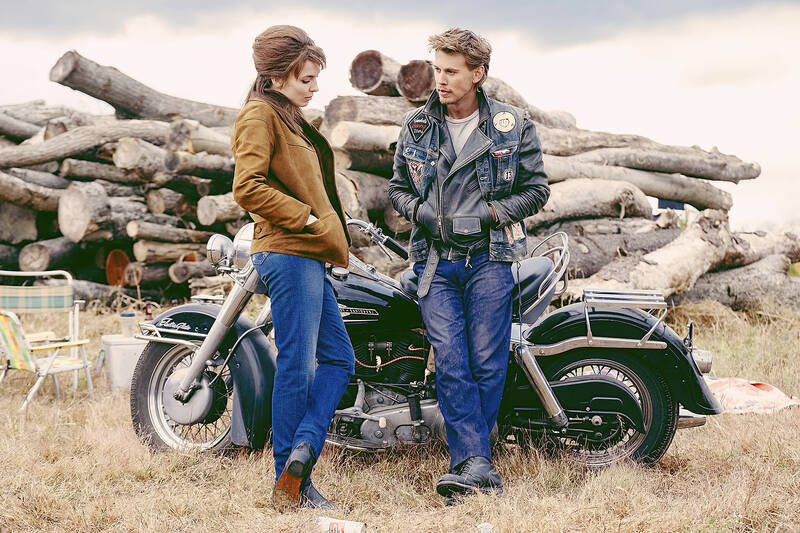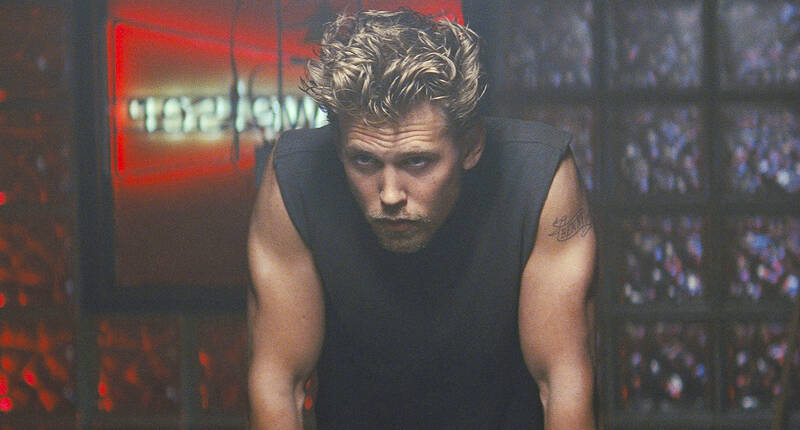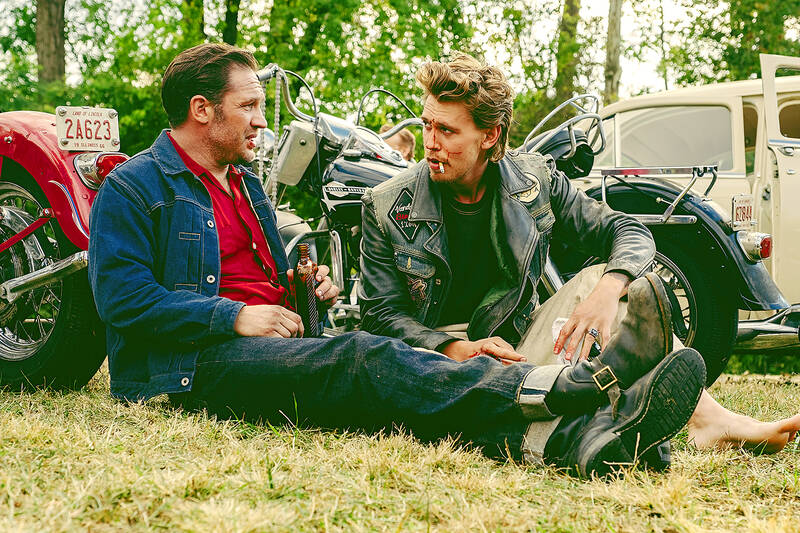Still images have been a source of wonder and mythology in the films of Jeff Nichols.
Mud, Nichols’ Twain-soaked Mississippi fable, seemed derived from the magical sight of a boat held aloft by a tree. Loving, about a ‘60s interracial marriage, took inspiration from tender Life magazine photographs taken of the real-life couple. Nichols’ latest, The Bikeriders, is based on photographer Danny Lyon’s 1968 book of the same name, for which he spent four years with a Chicago motorcycle club.
It’s not hard to see what Nichols saw in Lyon’s black-and-white stills. There’s the stylish raw materials — the chrome bikes, the slicked back hair, the black leather jackets. But there’s also a just emerging antiauthoritarian, easy-riding spirit and camaraderie. Like the central figures of Loving, they are classically drawn outsiders who encapsulate something glorious and uneasy about freedom in America.

Photo: AP
In the exhilarating first half of The Bikeriders, Nichols is less compelled to build a narrative around his bike gang, the Vandals (based on the Outlaws) than summoning an intoxicating atmosphere reminiscent of those old photographs. The Bikeriders eventually becomes saddled with heavier plot mechanics — you can almost sense his riders growing weary from having to strap narrative devices onto their bikes. The movie wants to ride, but it’s not sure how much story to pack for the trip. But this is a vivid dramatization of the birth of an American subculture.
The framing device Nichols settles on is Lyon, himself, played by Mike Faist, who’s conducting interviews for his book. His conversations with a woman named Kathy ( Jodie Comer ) bookend and sporadically narrate the movie.
Kathy, also based on a real person, seems at first an unlikely spokesperson for the gang. She speaks with a thick Illinois accent (an actorly distraction throughout) and has no affection for motorcycle riders. But one night at a bar, she sees Benny ( Austin Butler ) across the smokey room and, even if she doesn’t admit it at that moment, falls for him. Again, it’s not hard to see why. Butler is by now well removed from Elvis Presley but the suppleness with which he can sink into mid-century America is no less apparent. Benny drives Kathy home, parks his bike outside the place and patiently waits for her boyfriend to skip town.

Photo: AP
Nichols, a devotee of films like Hud and Cool Hand Luke, is a filmmaker who works very consciously within classic American idioms. In Butler he has his James Dean, making Tom Hardy his Marlon Brando. Hardy plays Johnny, Benny’s best pal and the one who starts up and presides over the Vandals. (The “whaddya got” clip of Brando from The Wild One is even briefly seen on a small TV in The Bikeriders.)
The Vandals, as a club, start about as simply as kids might call a tree house to order. They’re a bunch of guys who like riding motorcycles and like talking about them. Simple as that. But men come like moths to a flame, attracted by the tough lifestyle, the cool jackets with patches and a way out of mainstream America. Among them are Cal (Boyd Holbrook), Cockroach (Emory Cohen), Funny Sonny (Norman Reedus) and Zipco (Michael Shannon).
“Obscenity and motorcycles travel hand in hand,” someone says, with pride.

Photo: AP
The early days of the group are, it would seem, a lot of fun. Barroom brawls and riding carefree through corn fields. Most of these guys don’t have much, but they have each other. And their loyalty is total.
Kathy isn’t so sure sure. She watches the growing gang — a completely male bunch — with skepticism and fear for Benny. (In a scene teased in the film’s opening, he’s beaten badly enough to be hospitalized.) Sometimes, they throw down purely for fun. They are the original Fight Cub.
But soon, Kathy isn’t the only one with doubts at what they’ve created. As their gang grows, what the Vandals embody is less clear, even to Johnny and Benny. Some of the new entrants are coming straight back from Vietnam. Their old hijinks give way to more serious crimes. In one chastening scene, Kathy finds herself very nearly assaulted by its members. The gang — and all its posturing of toughness — begins to feel more like a trap for even its leader. Benny is drawn into a choice between the Vandals and Kathy. The homoerotic subtext is understated but not ignored; when Benny and Johnny discuss their future together, they do it gently and intimately, in the dark, like a secret confession.
As the Vandals’ original ideals disintegrate, it can feel like The Bikeriders gets locked into a familiar Goodfellas-like structure, but with a telling shift in narrator for a drama that’s ultimately about masculinity. This is a movie that’s juggling a lot of contradictory ambitions. It wants to be authentic but it wants to tell a grand America saga. It wants mythology but also naturalism. It’s those instincts that have made Nichols one of the most essential filmmakers of his generation, even if the results have sometimes been underwhelming by a hair. Even his best, most firmly rooted films (Take Shelter, Mud) strive for a balancing act that can be elusive.
But I think it’s those dual impulses — and, again, all the cool jackets — that makes The Bikeriders work. The movie is unabashedly romantic about the Vandals but it’s equally dubious about the rugged masculinity they embody, too. The Bikeriders has its hands firmly on the throttle just it does the brakes.

On April 26, The Lancet published a letter from two doctors at Taichung-based China Medical University Hospital (CMUH) warning that “Taiwan’s Health Care System is on the Brink of Collapse.” The authors said that “Years of policy inaction and mismanagement of resources have led to the National Health Insurance system operating under unsustainable conditions.” The pushback was immediate. Errors in the paper were quickly identified and publicized, to discredit the authors (the hospital apologized). CNA reported that CMUH said the letter described Taiwan in 2021 as having 62 nurses per 10,000 people, when the correct number was 78 nurses per 10,000

May 5 to May 11 What started out as friction between Taiwanese students at Taichung First High School and a Japanese head cook escalated dramatically over the first two weeks of May 1927. It began on April 30 when the cook’s wife knew that lotus starch used in that night’s dinner had rat feces in it, but failed to inform staff until the meal was already prepared. The students believed that her silence was intentional, and filed a complaint. The school’s Japanese administrators sided with the cook’s family, dismissing the students as troublemakers and clamping down on their freedoms — with

As Donald Trump’s executive order in March led to the shuttering of Voice of America (VOA) — the global broadcaster whose roots date back to the fight against Nazi propaganda — he quickly attracted support from figures not used to aligning themselves with any US administration. Trump had ordered the US Agency for Global Media, the federal agency that funds VOA and other groups promoting independent journalism overseas, to be “eliminated to the maximum extent consistent with applicable law.” The decision suddenly halted programming in 49 languages to more than 425 million people. In Moscow, Margarita Simonyan, the hardline editor-in-chief of the

Six weeks before I embarked on a research mission in Kyoto, I was sitting alone at a bar counter in Melbourne. Next to me, a woman was bragging loudly to a friend: She, too, was heading to Kyoto, I quickly discerned. Except her trip was in four months. And she’d just pulled an all-nighter booking restaurant reservations. As I snooped on the conversation, I broke out in a sweat, panicking because I’d yet to secure a single table. Then I remembered: Eating well in Japan is absolutely not something to lose sleep over. It’s true that the best-known institutions book up faster